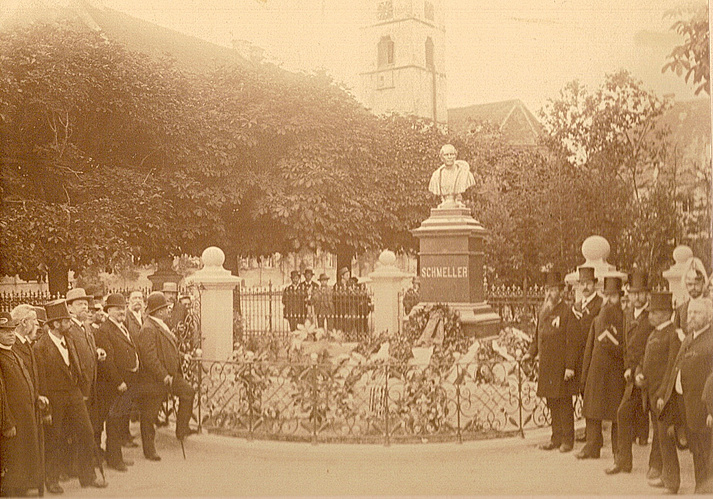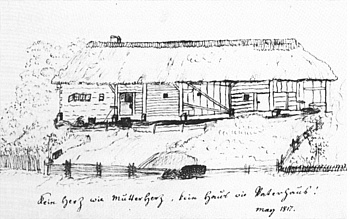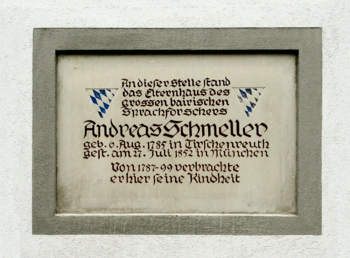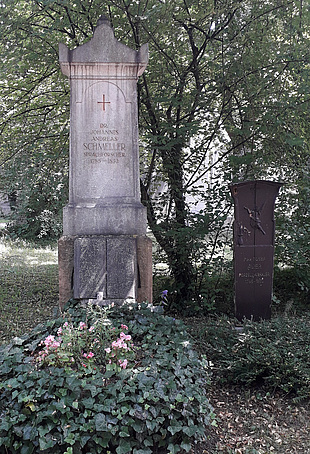Schmeller – the first dialect scholar
Johann Andreas Schmeller was born in Tirschenreuth (Upper Palatinate, Bavaria) on the 6th of August 1785 and spent his formative years in Rinnberg near Pfaffenhofen an der Ilm (Upper Bavaria). In spite of their poverty, Schmeller’s parents strove to help their son receive a good education.
At the age of ten Schmeller embarked on a varied school career. After several changes of school, he came to the Munich Lyceum run by Cajetan von Weiller, one of Bavaria’s leading proponents of the Enlightenment, who nourished Schmeller’s interest in the pedadogical theories of Johann Heinrich Pestalozzi. The Munich or Catholic Enlightenment would shape Schmeller’s outlook for the rest of his life.
In 1803, Schmeller quit school without sitting his exams – in solidarity with friends who had been expelled for being politically active in a students’ club.
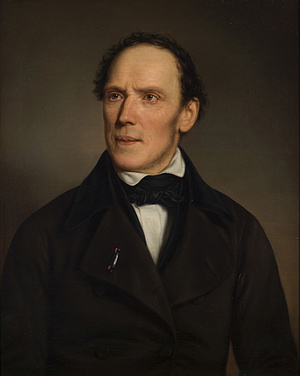
Military Service and Language Studies
In 1804, Schmeller set off to Switzerland, hoping for a job in Pestalozzi’s famous school in Yverdon. Pestalozzi turned him down, and he ended up enrolling for a Swiss Regiment serving in Spain. Here too, in Tarragona, Corporal Schmeller remained faithful to Pestalozzi’s pedagogical method.
In 1806, he was appointed teacher at a school for the children of military personnel and in that same year he went to Madrid to help set up a Pestalozzi school for the sons of officers. On the closure of this school in 1808, he returned to Switzerland and worked there in various teaching posts.
In an unpublished manuscript from 1812 „On the use of the Fatherland in Education”, he emphasises the importance of the mother tongue in education. This is by no means unusual for the age, but almost unheard of is his plea to use the pupils’ dialects too. And he notes in his diary the prophetic words: “I never inherited human wealth – no ancestors, no gold, no fields. Just the language. Words are my real-estate, which shall bring me bread – and perhaps even honour.”
Before these prophetic words were to come true, Schmeller once more served as a soldier. When Bavaria turned against Napoleon, he immediately returned home and reported for military service. He was appointed First Lieutenant, and his regiment marched into France in 1815 behind the victorious allies, without firing a single shot.
Co-founder of Germanic Philology
Alongside his friends the fairy-tale editors Jacob and Wilhelm Grimm, Schmeller belongs to the formative spirits of Germanic Philology. He was the first to study the philology of the dialects. His scientific base and spiritual home was the Bavarian Academy of Sciences. He became a Corresponding Member in 1823 and was promoted to Ordinary Member in 1829. He was also a head librarian at the Royal Court and State Library and became the first professor (albeit “Extraordinarius”) for Germanic Philology at Munich University and in later years the first professor as chair of Germanic Philology.
His work as a philologist and as a librarian are still relevant today, his “Bavarian Dictionary” is still in print and can be found on the shelves of many bookshops – there are very few philological works of the same age of which that can be said. His bust has a place in the Munich Hall of Fame.
Over and beyond his dictionary and Bavarian grammar, Schmeller was interested in other philological topics. For example, after undertaking two field trips to the Cimbrian dialect enclaves of Northern Italy, he published a Cimbrian Dictionary and Grammar. Typical for Schmeller is a diary entry from 1821. Sitting over the proof corrections to his dictionary, he explains how he distracts himself from this arduous task:
“To avoid expiring of boredom and weariness with life, I have lined up my grammars, and every day I work on another language. They come in the order: Sanscrit, Persian, Arabic, Hebrew, Magyar, Greek (Ancient and Modern), Latin, Italian, Portuguese, Spanish, French, Russian, Bohemian, Polish. English, Danish, Dutch.“
Legacy
Johann Andreas Schmeller died on the 27th of July 1852. He was buried in Munich’s Old Southern Cemetry (area 2, row 7, place 40). His entire private and scientific archives are held in the Bavarian State Library in Munich.
Schmeller’s diaries, edited by P. Ruf, permit important insights into everyday life in the Munich of his time, and into the history of the University and the Academy of Sciences in Munich in the first half of the Nineteenth Century.
His correspondence, edited by W. Winkler, documents close friendships, and throws light on his private and professional contacts with scholars from across Europe.
